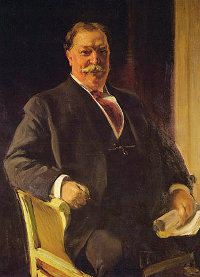
In 1864, as Abraham Lincoln fought for re-election during the Civil War, he was eager to admit Nevada to the Union because of its pro-Unionist and largely Republican sympathies. James Nye, governor of the territory, sent certified copies of the Nevada constitution overland to Washington, but on Oct. 24 they still hadn’t arrived. So he sent the entire constitution by telegram.
Telegrapher James H. Guild worked for seven hours to transmit the document in Morse code. Because there was no direct link from Carson City to Washington, he had to send it to Salt Lake City, whence it bounced to Chicago, then Philadelphia, and finally the War Department’s telegraph office at the capital. Above is the final page of the 175-page transcription, showing the word count (16,543) and the cost ($4,303.27, about $60,000 today).
Three days later, just eight days before the election, Nevada was admitted to the Union, and Lincoln was re-elected president.








